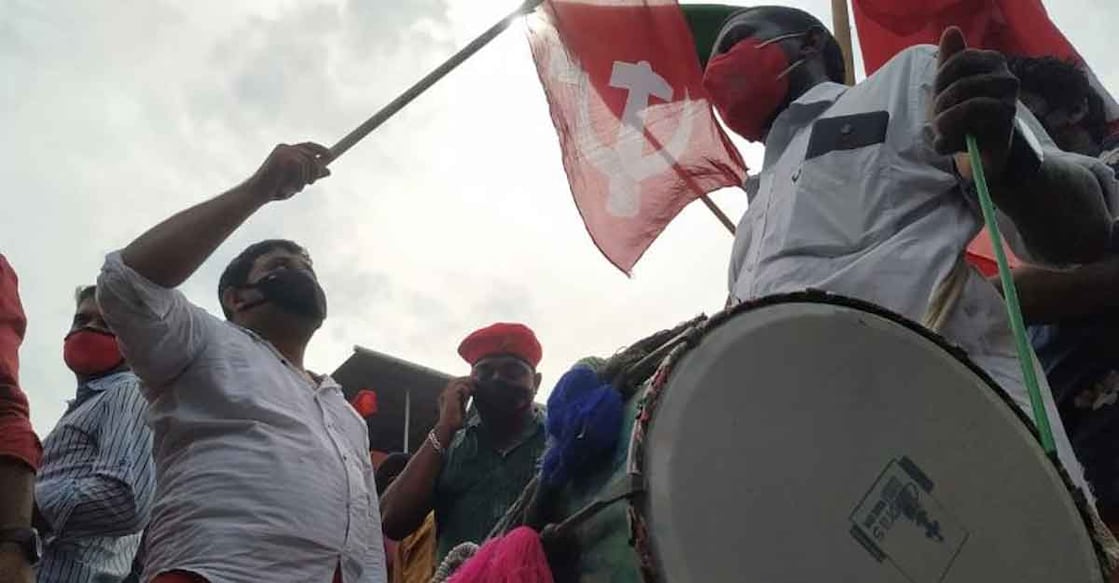Analysis | How CPM blocked the onward march of BJP in Thiruvananthapuram

Mail This Article
Kerala's instinctive objection to the BJP gaining the upper hand, which was gloriously demonstrated during the 2019 Lok Sabha polls, was once again at play, this time during the elections to the Thiruvananthapuram Corporation.
In 2019, the vote was to prevent the BJP from coming to power at the Centre. In 2020, it was to prevent the emergence of the first BJP-ruled Corporation in Kerala.
In 2019, the Kerala voter had felt that the Congress party was better placed to keep the BJP out of power. When faced with the prospect of a second Modi government, she thought nothing of wiping out the LDF from the contest.
More than a year later, the voter has found the CPM-led LDF to be the best bet to scupper BJP's ambition of ruling the Kerala capital. In the process, the Congress, and the UDF, has virtually vanished from the scene. The LDF managed to secure a simple majority (51 seats) and the NDA could not even hold on to its 2015 tally of 35 (it had only 34 this time). The UDF, which had 21 seats last time, was reduced to 10.
The BJP's much-vaunted march has been stalled.
Modi's pride and 'love jihad' fears
There was a certainty to the Sangh Parivar belief that the BJP would capture Thiruvananthapuram Corporation in 2020. Last time, the BJP alone had secured 34 seats, just one short of the 35 the CPM had. The 2015 contest was so close that the CPM beat the BJP in the Estate and Vanchiyoor wards for one and three votes respectively.
Thiruvananthapuram's enthusiasm for BJP's majoritarian tendencies was given a clear expression a year later when O Rajagopal won from Nemom, the first and only BJP MLA in Kerala. It was almost as if a BJP-ruled Corporation was inevitable.
Here is what a top BJP leader told this correspondent during the campaign: “Next time when Modi-ji visits Thiruvananthapuram, he would be received by a BJP mayor. Imagine the pride in our Prime Minister's face.”
Perhaps to fill the Prime Minister with pride, the BJP had unleashed a divisive whisper campaign in the Hindu dominated wards of the Corporation. Hindu families were warned of 'love jihad' and, hoping to disturb them spiritually, were told that Attukal Pongala would be disrupted “just like Sabarimala” if any other party came to power.
Spurning of Poonthura Siraj
It was then that the CPM put itself right across the BJP, projected itself as the most credible secular formation in the Corporation. An uncompromising stand taken at the time of candidate selection was a fine advertisement of CPM's anti-communal credentials.
Abdul Nasser Madani's right-hand man Poonthura Siraj left People's Democratic Party (PDP) and wanted to contest as Indian National League (INL, an LDF constituent) candidate from Manikyavilakom ward. The INL was excited as Siraj was hugely popular in the Muslim-dominated coastal ward. The CPM district unit put its foot down, saying the LDF will have nothing to do with extremist elements.
This was a clear political message given to secular-minded Hindu voters in the Corporation.
Wishy-washy UDF
Between the CPM and the BJP, the UDF looked neutral in a very uninspiring way. It was not clear what the UDF stood for, and the CPM, by constantly harping about the Congress's alliance with Jamaat-e-Islami, solidified the image of the Congress as an ideologically confused entity.
So to prevent what looked like an imminent BJP rise, the secular-minded voters knew where to press the button on the voting machine. Wherever it was felt the BJP had a chance, say Punchakkari, Njandoorkonam, Pattom, Vattoyoorkavu, Valiyasala, Attukal, Sreevaraham and Attipra there was a dramatic, a more than natural, fall in UDF votes. In all these cases the UDF candidates polled less than 900 votes. It has to noticed that within the corporation, Congress has two influential MLAs (V S Sivakumar and M Vincent) and is represented by a hugely popular MP, Shashi Tharoor.
Zero-sum game: UDF loss is LDF's gain
Take for instance Punchakkary, the sitting seat of RSP (UDF). This time, intending to wrest this UDF bastion, the BJP fielded one of its most popular councillors, Sanilkumar. When the results came in, even the large number of votes (2215) polled in Sanilkumar' favour was not enough. The CPM candidate D Sivankutty had 1010 votes more, he polled 3225 votes.
The CPM surge felt almost unnatural but it was explained by the poor number of votes secured by the RSP candidate, Dr N A Sudheeh Kumar: 711.
Something similar happened in Attukal, a BJP ward. The Congress candidate Manikantan C A polled just 868 votes allowing the CPM candidate R Unnikrishnan to amass 2560 votes, enough to beat BJP's Sunil Kumar who secured 2155 votes, a slender margin of 405 votes.
The CPM could wrest Kamaleswaram from the BJP for just 148 votes only because the Congress candidate polled a low 719 votes. The CPI got the better of BJP in its stronghold Sreevaraham for just 202 votes and here the Congress candidate had polled an unlikely low 408 votes. The CPM managed to take over Attipra from the BJP with an even lesser margin than Sreevaraham, 198 votes. Here again, the poor votes (less than 500) polled by the Congress candidate allowed the CPM to squeeze through.
But wherever the Congress picked up more than 1000 votes, Kanjirampara and Powdikkonam ward for instance, or where it had a popular candidate like in Chempazhanthy (Aniyoor M Prasanna Kumar) and Sasthamangalam (Sasthamangalam Gopan) wards, the CPM failed to thrust the BJP aside.
The BJP, however, held on to its urban circuits, the upper-middle-class PTP Nagar-Poojappura stretch where it won six wards and the Karamana-Kalady-Nemom urban and semi-urban loop where it won nine wards.
The BJP did lose a prestigious urban ward, Pattom, to the CPI. The reason is not hard to guess: less than 900 votes polled by the Congress candidate.


